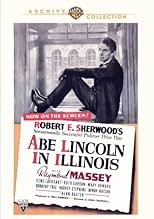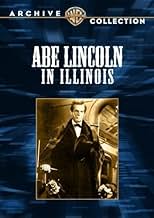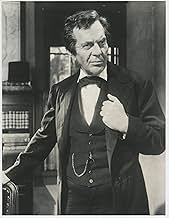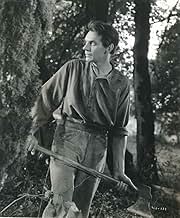CALIFICACIÓN DE IMDb
7.3/10
2.2 k
TU CALIFICACIÓN
Humble Abraham Lincoln se gana el respeto de sus vecinos de Illinois, creciendo en estatura y respeto hasta que es elegido presidente en 1860 y se marcha a Washington.Humble Abraham Lincoln se gana el respeto de sus vecinos de Illinois, creciendo en estatura y respeto hasta que es elegido presidente en 1860 y se marcha a Washington.Humble Abraham Lincoln se gana el respeto de sus vecinos de Illinois, creciendo en estatura y respeto hasta que es elegido presidente en 1860 y se marcha a Washington.
- Dirección
- Guionistas
- Elenco
- Nominado a 2 premios Óscar
- 2 premios ganados y 2 nominaciones en total
Howard Da Silva
- Jack Armstrong
- (as Howard da Silva)
Opiniones destacadas
10lugonian
ABE LINCOLN IN ILLINOIS (RKO Radio, 1940), directed by John Cromwell, is not so much a biography of Abraham Lincoln, but the life Lincoln lived from his early years to a position that would lead him to politics, and against all odds, his winning the election for the United States presidency in 1860. Based on the Pulitzer Prize winning 1938 play by Robert E. Sherwood, the screen adaptation, tracing Lincoln's thirty years starting in 1831 to his train ride leading to Washington, D.C., in 1861, stars Raymond Massey in a role he originated on stage, being the best performance of a great American ever enacted by an actor who wasn't. Massey, a Canadian by birth, is not only the perfect candidate for the title role, but an ideal choice. Massey's believability in his role earned him an Academy Award nomination as Best Actor. Although he didn't win the election for that year, it is Massey who very well holds this movie together.
A follow-up of sorts to John Ford's most recent YOUNG MR. LINCOLN (20th Century-Fox, 1939), starring Henry Fonda, focusing on Lincoln's early years as a young lawyer in Springfield, Ill., and a retelling in parts to D.W. Griffith's ABRAHAM LINCOLN (United Artists, 1930), starring Walter Huston, ABE LINCOLN IN ILLINOIS starts off on a rainy afternoon in 1831 with an introduction to the character of Abraham Lincoln (Raymond Massey), age 22, sitting on the floor in a log cabin reading a book by Shakespeare, accompanied by his father (Charles B. Middleton) and a stepmother (Elisabeth Risdon). With the Lincoln family background briefly depicted, the next scene follows Abe, who had left home to accept a $30 a month job as part of the crew rowing a flatboat hauling hogs down the Sangamon River to New Orleans. Along the way he encounters a very beautiful girl named Ann Rutledge (Mary Howard), with whom he decides to settle down in her native town of New Salem where he becomes in charge of a general store, a position offered him by his employer, Denton Offut (Harlan Briggs). When he finds Jack Armstrong (Howard Da Silva), the greatest fighter who cannot be beat, a little drunk and annoying Ann, who, along with his other friends, having invaded her tavern, Abe, a stranger in town, comes to the young lady's defense and publicly wrestles Jack to the end, defeating his advisory and winning the admiration from all, especially the respect and loyal-ship of Jack Armstrong. The year 1832 profiles Lincoln acting as leader in command of his soldiers, with Armstrong being among them, during the Blackhawk War period; 1835 now finds Lincoln in a new position as postmaster general. He is visited by Joshua Speed (Minor Watson) and Ninian Edwards (Harvey Stephens) who introduce Abe to politics by choosing him to serve in the legislature, which he would serve four terms. As for Ann, having been engaged to John McNeil (Maurice Murphy), now living in New York for two years, finds that after receiving a letter from him that he has no intentions of returning to her. To stop gossip from circulating around Ann's good name, Abe admits his love for her from the moment he first saw her, and asks her to become his steady. The relationship between them is cut short when she is stricken with an illness and dies. Lincoln quits the legislation to work in the law office with John Stuart in Springfield, forming a partnership of Stuart & Lincoln, Counselors-at-Law. Slowly improving his social position, Lincoln is introduced to Mary Todd (Ruth Gordon) at a function given by her sister and Ninian's wife, Elizabeth Edwards (Dorothy Tree). Elizabeth wants Mary to marry an aristocrat, someone like Stephen A. Douglas (Gene Lockhart), but her interest rests on Mr. Lincoln, whom she eventually marries on November 4, 1842. The marriage produces four sons (the movie indicates three, eliminating one who died in his fourth year), and shows Mary's fight in having her hayseed husband fulfill his destiny, to become president of the United States.
Ruth Gordon (1896-1985), a prominent stage actress and playwright, in her movie debut, gives a remarkable performance in one of the best carnations of Mary Todd Lincoln ever portrayed on screen. Gene Lockhart (1892-1957), a veteran character actor in many feature film roles, goes unnoticed as a very satisfying Stephen A. Douglas (1813-1861). Lockhart's best moment finds his Stephen Douglas sincerely congratulating his opponent Abraham Lincoln in winning the U.S. election, something that should become a prime example with modern-day candidates.
As mentioned before, ABE LINCOLN IN ILLINOIS is very much a retread to D.W. Griffith's 1930 presentation of ABRAHAM LINCOLN, with differences being the elimination of Lincoln's birth, his trying years in the White House during the Civil War and assassination in April 1865. In many ways, ABE LINCOLN IN ILLINOIS is an excellent movie with excellent portrayals. Being a screen adaptation to a stage play, John Cromwell's direction, makes no indication as such. Minus Technicolor, it's full of outdoor scenery and historical detail ranging from costumes to reproductions of small towns. Highlights include the well staged Lincoln-Douglas debate, and one where Lincoln finally losing his temper towards his wife, Mary, after embarrassing him in front of his committee, by ordering her, twice, "You're not/never to do that again!"
ABE LINCOLN IN ILLINOIS, formerly shown on commercial television annually either on or around Lincoln's birthday, February 12, later presented on video cassette finally on cable television's American Movie Classics prior to 2000, and Turner Classic Movies. Quite enjoyable as a motion picture, and quite informative on a historical point of view, this production, at 110 minutes, succeeds on both counts. "Glory, Glory Hallelujah, his truth is marching on." (****)
A follow-up of sorts to John Ford's most recent YOUNG MR. LINCOLN (20th Century-Fox, 1939), starring Henry Fonda, focusing on Lincoln's early years as a young lawyer in Springfield, Ill., and a retelling in parts to D.W. Griffith's ABRAHAM LINCOLN (United Artists, 1930), starring Walter Huston, ABE LINCOLN IN ILLINOIS starts off on a rainy afternoon in 1831 with an introduction to the character of Abraham Lincoln (Raymond Massey), age 22, sitting on the floor in a log cabin reading a book by Shakespeare, accompanied by his father (Charles B. Middleton) and a stepmother (Elisabeth Risdon). With the Lincoln family background briefly depicted, the next scene follows Abe, who had left home to accept a $30 a month job as part of the crew rowing a flatboat hauling hogs down the Sangamon River to New Orleans. Along the way he encounters a very beautiful girl named Ann Rutledge (Mary Howard), with whom he decides to settle down in her native town of New Salem where he becomes in charge of a general store, a position offered him by his employer, Denton Offut (Harlan Briggs). When he finds Jack Armstrong (Howard Da Silva), the greatest fighter who cannot be beat, a little drunk and annoying Ann, who, along with his other friends, having invaded her tavern, Abe, a stranger in town, comes to the young lady's defense and publicly wrestles Jack to the end, defeating his advisory and winning the admiration from all, especially the respect and loyal-ship of Jack Armstrong. The year 1832 profiles Lincoln acting as leader in command of his soldiers, with Armstrong being among them, during the Blackhawk War period; 1835 now finds Lincoln in a new position as postmaster general. He is visited by Joshua Speed (Minor Watson) and Ninian Edwards (Harvey Stephens) who introduce Abe to politics by choosing him to serve in the legislature, which he would serve four terms. As for Ann, having been engaged to John McNeil (Maurice Murphy), now living in New York for two years, finds that after receiving a letter from him that he has no intentions of returning to her. To stop gossip from circulating around Ann's good name, Abe admits his love for her from the moment he first saw her, and asks her to become his steady. The relationship between them is cut short when she is stricken with an illness and dies. Lincoln quits the legislation to work in the law office with John Stuart in Springfield, forming a partnership of Stuart & Lincoln, Counselors-at-Law. Slowly improving his social position, Lincoln is introduced to Mary Todd (Ruth Gordon) at a function given by her sister and Ninian's wife, Elizabeth Edwards (Dorothy Tree). Elizabeth wants Mary to marry an aristocrat, someone like Stephen A. Douglas (Gene Lockhart), but her interest rests on Mr. Lincoln, whom she eventually marries on November 4, 1842. The marriage produces four sons (the movie indicates three, eliminating one who died in his fourth year), and shows Mary's fight in having her hayseed husband fulfill his destiny, to become president of the United States.
Ruth Gordon (1896-1985), a prominent stage actress and playwright, in her movie debut, gives a remarkable performance in one of the best carnations of Mary Todd Lincoln ever portrayed on screen. Gene Lockhart (1892-1957), a veteran character actor in many feature film roles, goes unnoticed as a very satisfying Stephen A. Douglas (1813-1861). Lockhart's best moment finds his Stephen Douglas sincerely congratulating his opponent Abraham Lincoln in winning the U.S. election, something that should become a prime example with modern-day candidates.
As mentioned before, ABE LINCOLN IN ILLINOIS is very much a retread to D.W. Griffith's 1930 presentation of ABRAHAM LINCOLN, with differences being the elimination of Lincoln's birth, his trying years in the White House during the Civil War and assassination in April 1865. In many ways, ABE LINCOLN IN ILLINOIS is an excellent movie with excellent portrayals. Being a screen adaptation to a stage play, John Cromwell's direction, makes no indication as such. Minus Technicolor, it's full of outdoor scenery and historical detail ranging from costumes to reproductions of small towns. Highlights include the well staged Lincoln-Douglas debate, and one where Lincoln finally losing his temper towards his wife, Mary, after embarrassing him in front of his committee, by ordering her, twice, "You're not/never to do that again!"
ABE LINCOLN IN ILLINOIS, formerly shown on commercial television annually either on or around Lincoln's birthday, February 12, later presented on video cassette finally on cable television's American Movie Classics prior to 2000, and Turner Classic Movies. Quite enjoyable as a motion picture, and quite informative on a historical point of view, this production, at 110 minutes, succeeds on both counts. "Glory, Glory Hallelujah, his truth is marching on." (****)
If only we could've cloned Mr. Massey back in 1940, and then waited for a scriptwriter who could take a more controlled hand with historical accuracy than was fashionable in those days, and released the movie today...this remains my favorite treatment of one of my favorite historical figures; Massey seems born to have played Lincoln, from the obvious physical resemblance to the supposed mannerisms, and in doing so far outshines other Lincoln performances (Fonda's and Peck's come to mind). My peeve with the film is with historical detail, and I realize that Hollywood willingly sacrifices accuracy for dramatic artifice without so much as a blush...
I have seen this film probably 15 times or more and have been a devotee of the Lincoln mythology (for lack of a better term) for nearly 20 years. I remember first seeing the film as a youngster on the same weekend as the death and funeral of President Kennedy in November of 1963. At that time, the two scenes that struck me as most memorable to my young mind was the one where the local woman tells Lincoln that he is the homeliest man in the county; and, the other scene where Lincoln is telling the slightly off-color joke to a crowd about the man fighting the bear. Also, another visual that sticks in my memory is the somewhat haunting scene where Lincoln revisits New Salem after the once thriving city has become a ghost-town.
There are several marvelous aspects of this movie. To begin with, is the near perfect physical and emotional representation of Lincoln by Raymond Massey. Given the photographs of the pre-president Lincoln, making Massey into sixteenth president seems nearly ordained from the beginning. The height, facial structure, and body type is nearly a perfect fit. Regarding how Lincoln spoke, it is hard to determine if that is an accurate representation or not. Historical accounts of Lincoln says that he had a rather high and not necessarily soothing voice. Since, it would be another 30 plus years before there is any kind of recording device, Massey's voice should seem appropriate enough.
Additionally, the cinematography is excellent. The on-location or natural shots are superior by black and white standards. Even though I am a devotee of black and white films, color films seem to have the upper hand when filming wide-open or rustic environments. The feel of the indoor scenes such as the ones within the Lincoln Springfield home is nearly perfect for the times. You can virtually smell the cigar smoke or the burning wood stove. Finally, the lighting during the campaign speech scenes are awesome.
But, the best part of the movie is how even with some artistic license the characters surrounding Lincoln are historically strong and represent in a film microcosm a very accurate historical reality of Lincoln's early years. For example, starting with Ruth Gordon's portrayal of Mary Linoln Todd. With her character, you can easily feel how much she effected Lincoln. Her persistent pressure on Lincoln to achieve political importance and her hard-nose, sometimes loving, sometimes bitter prescience is from my historical reading just about perfect. Since the film takes place before Lincoln is actually president, Mary Todd Lincoln's shenanigans within the White House or her emotional unraveling in her later years is not an issue here.
The romance demonstrated between Lincoln and Ann Rutledge, although later to be historically challenged, then even later to be considered historically (possibly) significant, is quite sadly moving. It is nicely juxtaposition-ed against the image of Mary Lincoln Todd.
Howard De Silva as New Salem's local ruffian is although somewhat embellished, still represents Lincoln's ability to relate to people from all walks of life. The film just seems to find the vital essence of young Lincoln before he became president.
The surreal, final scene of Lincoln leaving Springfield for Washington D.C. (again although actually happening during the day during a rainstorm)after giving one of his many great historical speeches ("this is where I have lived") catches the eerie but profound feel of how important his leadership is going to mean to the struggling republic. The playing of the "Battle Hymnn of the Republic" although premature, is still simple perfect.
There are several marvelous aspects of this movie. To begin with, is the near perfect physical and emotional representation of Lincoln by Raymond Massey. Given the photographs of the pre-president Lincoln, making Massey into sixteenth president seems nearly ordained from the beginning. The height, facial structure, and body type is nearly a perfect fit. Regarding how Lincoln spoke, it is hard to determine if that is an accurate representation or not. Historical accounts of Lincoln says that he had a rather high and not necessarily soothing voice. Since, it would be another 30 plus years before there is any kind of recording device, Massey's voice should seem appropriate enough.
Additionally, the cinematography is excellent. The on-location or natural shots are superior by black and white standards. Even though I am a devotee of black and white films, color films seem to have the upper hand when filming wide-open or rustic environments. The feel of the indoor scenes such as the ones within the Lincoln Springfield home is nearly perfect for the times. You can virtually smell the cigar smoke or the burning wood stove. Finally, the lighting during the campaign speech scenes are awesome.
But, the best part of the movie is how even with some artistic license the characters surrounding Lincoln are historically strong and represent in a film microcosm a very accurate historical reality of Lincoln's early years. For example, starting with Ruth Gordon's portrayal of Mary Linoln Todd. With her character, you can easily feel how much she effected Lincoln. Her persistent pressure on Lincoln to achieve political importance and her hard-nose, sometimes loving, sometimes bitter prescience is from my historical reading just about perfect. Since the film takes place before Lincoln is actually president, Mary Todd Lincoln's shenanigans within the White House or her emotional unraveling in her later years is not an issue here.
The romance demonstrated between Lincoln and Ann Rutledge, although later to be historically challenged, then even later to be considered historically (possibly) significant, is quite sadly moving. It is nicely juxtaposition-ed against the image of Mary Lincoln Todd.
Howard De Silva as New Salem's local ruffian is although somewhat embellished, still represents Lincoln's ability to relate to people from all walks of life. The film just seems to find the vital essence of young Lincoln before he became president.
The surreal, final scene of Lincoln leaving Springfield for Washington D.C. (again although actually happening during the day during a rainstorm)after giving one of his many great historical speeches ("this is where I have lived") catches the eerie but profound feel of how important his leadership is going to mean to the struggling republic. The playing of the "Battle Hymnn of the Republic" although premature, is still simple perfect.
If you've ever wanted to hear what Abe Lincoln sounded like, this is the film you'll want to see. Lincoln is portrayed by the late Canadian actor Raymond Massey - who, amongst many other roles, is also remembered from HG Welles' Things to Come, the screenplay of which was written by HG Welles himself. Early in Massey's career, Lincoln's son, Robert Todd Lincoln, heard him perform and was struck by the similarity between Massey's speaking voice and that of his father. Since there are no recordings of Lincoln from that era shortly before Edison invented the Gramophone, we have to rely on descriptions of his voice. Some from that time state Lincoln's voice was high-pitched, and that Massey did not do the voice properly - however, I tend to give more credence to a living witness, Lincoln's own eldest son who, though he died 14 years prior to this film, still had the opportunity to see Massey on stage and hear his voice. Massey got it right, and this is one wonderful film - too bad I haven't found it on DVD - the next time it airs on TMC I'll have to record a DVD of it for myself.
With all due respect to Henry Fonda, Walter Huston, and a myriad of other cinematic Lincolns, Raymond Massey is the Abe to end all Abes. His moving and mesmerizing performance gives us the real Mr. Lincoln in all his complexity. Alongside the warmth, compassion and humor for which we love and revere Mr. Lincoln, we see in Massey the dark side as well: the doubts, fears, indecision and deep melancholia with which Abraham Lincoln struggled his whole life, and which clashed with his fierce ambition. Ruth Gordon is superb as Lincoln's equally ambitious wife, Mary Todd Lincoln. No hagiography, this movie lets us see the Lincolns as human beings with real "issues", rather than mere heroes of history.
Besides all this, we have Massey's astonishing physical resemblance to Lincoln.
What's most amazing is that the spirit of this most quintessentially American of our American heroes should be so wonderfully captured and portrayed by.... a Canadian!
Besides all this, we have Massey's astonishing physical resemblance to Lincoln.
What's most amazing is that the spirit of this most quintessentially American of our American heroes should be so wonderfully captured and portrayed by.... a Canadian!
¿Sabías que…?
- TriviaAfter his success playing Lincoln in the film and on Broadway, Raymond Massey began to assume the character in real life. He often appeared at social gatherings dressed in Lincoln-esque attire, assuming a Lincoln-like manner and speech. His friend, the playwright George S. Kaufman, observed, "Massey won't be satisfied until someone assassinates him."
- ErroresWhen results for the 1860 election are being received, West Virginia is listed on the the state-by-state tally board. West Virginia didn't become a state until 1863, when it broke off from Virginia after that state had seceded from the Union.
- Citas
Mentor Graham: Well, Abe, there are always two occupations open to those who have failed at everything else: school teaching and politics.
- ConexionesFeatured in History Brought to Life (1950)
- Bandas sonorasOld Abe Lincoln Came Out of the Wilderness
(uncredited)
Traditional
Sung by chorus over opening credits
Selecciones populares
Inicia sesión para calificar y agrega a la lista de videos para obtener recomendaciones personalizadas
- How long is Abe Lincoln in Illinois?Con tecnología de Alexa
Detalles
Taquilla
- Total en EE. UU. y Canadá
- USD 1,451,880
- Tiempo de ejecución1 hora 50 minutos
- Color
- Relación de aspecto
- 1.37 : 1
Contribuir a esta página
Sugiere una edición o agrega el contenido que falta


























